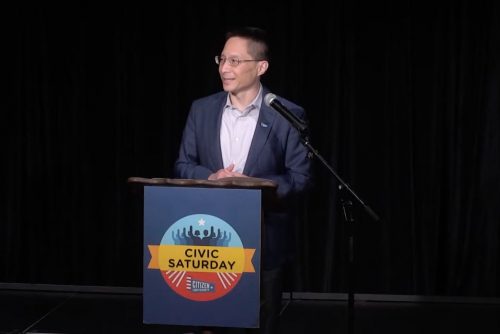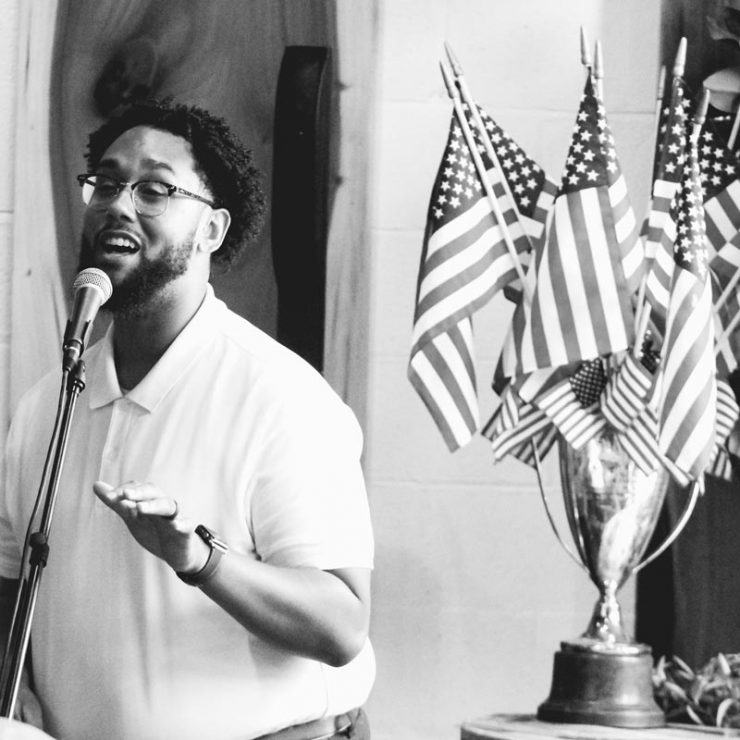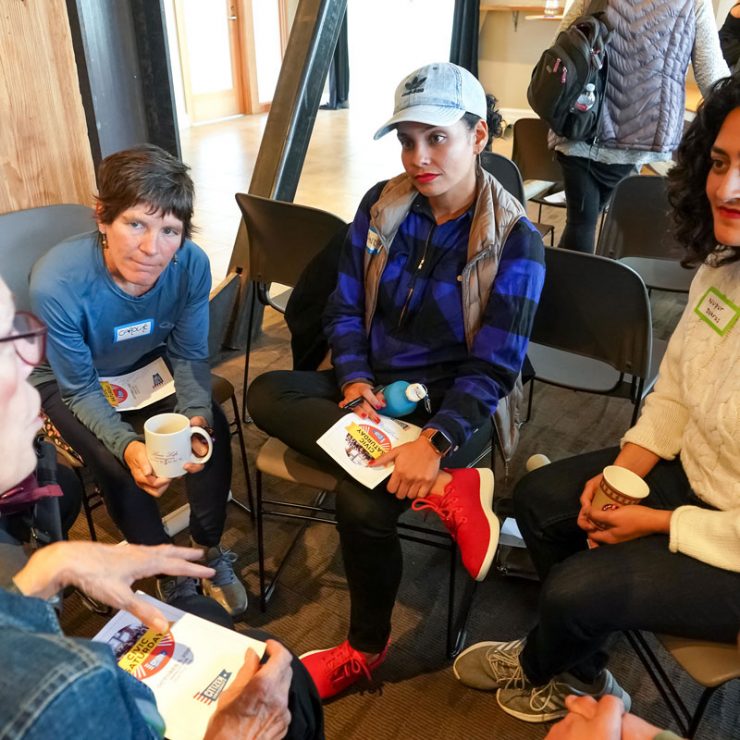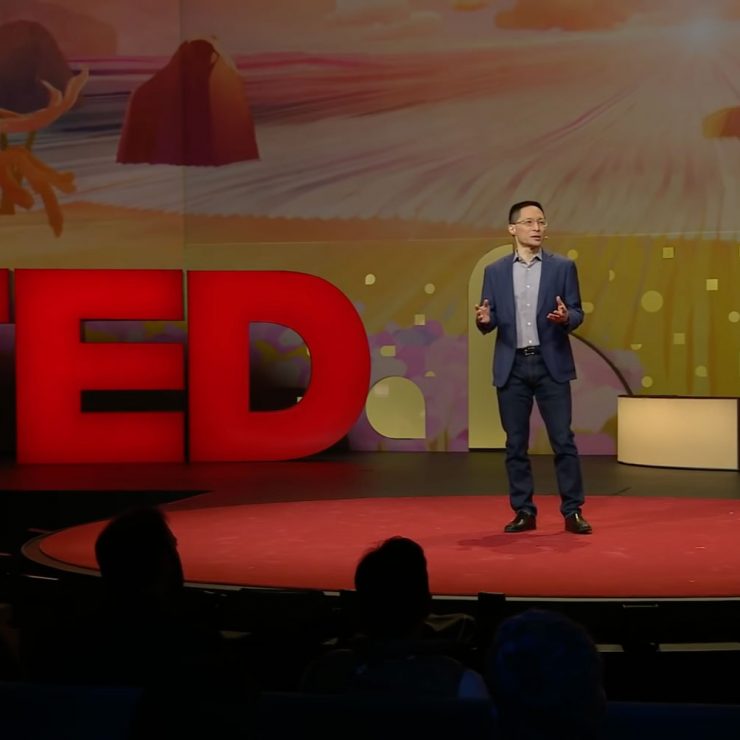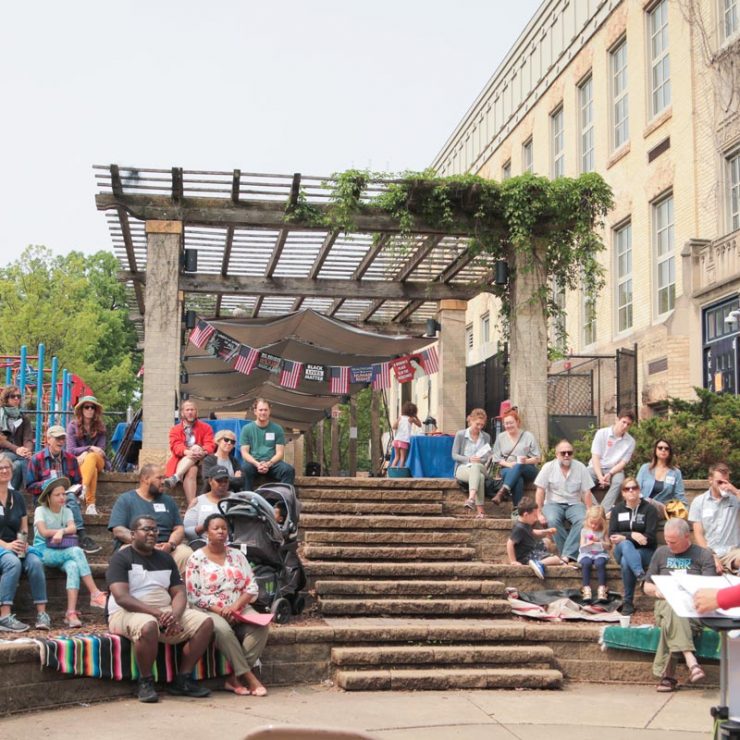What a gift it is to be with you today.
It’s so much at once to be gathered in person and yet staying masked, distanced, and limited in numbers, while gathering virtually at the same time. It’s joy and anxiety, relief and stress all at once. So let’s just be here together and do the thing that this virus imperils most and takes away first. Let us breathe. Quietly, peacefully, together. Let’s look around at each other as we breathe. To face the times and one another.
Listen to the sermon in this replay of Civic Saturday.
I hope you feel something like what I feel. I hope you feel anything at all, actually. Because one secondary somatic consequence of this pandemic is that it works like a numbing agent. We grow increasingly numb to the problems that persist in every part of our society. Numb to the new surge of cases and to death in other places. Numb to the dysfunction of national politics. Numb to the failures of local politicians. Numb to disinformation and misinformation online. The nerves of the body politic are dulled.
Part of it is simple fatigue. But I believe something deeper is going on: the dissipation of the spirit that occurs when grief and pain go unacknowledged and unrecognized.
Acknowledgment and recognition are the amino acids of civic life: the sticky stuff that allows bonds of trust and affection to form, that allows the proteins of trust and respect to emerge, feeding new compounds that give rise to a complex adaptive self-governing system. I feel you. I see you. Take out I feel you and I see you and the body politic degenerates rapidly into a mass of putrid mush.
It degenerates into something like we are seeing all across the land today.
Let us acknowledge and recognize our common grief. Not all of us have lost someone to Covid. But all of us have lost something.
A job, a home, a sense of belonging, a feeling of being fully human. What have you lost? What have we lost?
After someone we love dies, we might yearn for the past. But what we grieve is the future – a shared future that can no longer be. To dampen the ache of grief, or to escape it altogether, we often turn our gaze backward.
My mother died in March, of cancer. Two or three times a week now I drive over to her condo, where she spent her last year and a half. I water the plants she had selected for her garden: the ground rose and the heather, the tall grasses and the tree peony that blossomed soon after she passed. After a while I come in and sit across from her comfy green chair in the corner, and I recreate the small sensations of care and fleeting contentment, the micro-routines of daily living that we made and tried to sustain as her body weakened. After a while, still sitting there, I exit the realm of memory and come face-to-face again with the future that does not include her.
Then it is time to get on with my day. What an American thing to think. Places to be, meetings to do. But “getting on” and “moving on” is not something we simply get to do by saying it’s time. It’s something we earn by putting in the time.
Our country today is awash in unanswered festering grief. What have we lost? Too much to count. Yet too much not to account for. Among the many ways we have been failed by our leaders during the pandemic – electeds, technocrats, business chiefs, people of faith, you name it – perhaps most damning is how they have failed to lead us in grief.
As Ella Baker said and I always quote: strong people don’t need strong leaders. So let’s grieve like a strong people.
Let’s name our pain and sadness. And then, after an interval, let’s face this future full of absences, lest we fall too much in love with grief.
The poet Ada Limón writes in her collection The Carrying: “Funny thing about grief, its hold is so bright and determined like a flame, like something almost worth living for.”
When I came upon that line, it tempered my disgust with so many of my fellow Americans in this third wave of Covid. It gave me a dose of compassion for those whose lives have been so suffused by loss and the foreshortening of a future – not just by the pandemic but by other invisible forces that have worked to shrink their lives over the last two generations – the offshoring of jobs and the redlining of cities, the winner-take-all economy that makes losers of most and anxious hoarders of the rest. I felt for, I felt with those whose lives have been compacted like trash into cubes of scrap, such that all they want is the life-affirming nihilism of now – the taste of transcendence that arises when you give yourself over completely to the feeling that risk and danger matter no more.
It is a grief, as Limón says, almost worth living for. Perhaps even worth dying for.
That was some of those lost people who climbed into the Capitol on January 6. That is the young people shooting each other a few blocks from here for no good reason other than it makes them feel powerful. That is the people whose painkillers killed them. That is the people doing a slow-motion suicide dance called deliberate non-vaccination.
Six hundred and sixteen thousand souls. That 616,000 is not, as some would like to convince themselves, the number of people who would have died anyway from the flu or whatever. It contains over 300,000 excess deaths. We’ve all gotten accustomed to the clinical language of public health and the medical establishment, so we don’t flinch anymore at terms like “excess deaths.” But we should flinch. We should recoil in horror. Six hundred thousand, three hundred thousand – these are Civil War scale.
End the pandemic today and we’d have to ask: how many excess deaths did we tolerate in what used to be called normal times? Are the 20,000 people who die a year from gun violence excess? Or to be expected? The thousands who die every year of undernourishment, of overheating, of the flooding that our broiling churning climate begets – are they excess deaths or to be expected?
We as Americans do not reckon with death. Which means we do not reckon with life. We are scared to live honestly.
We take refuge in Big Lies and little liars. Baldwin:
“It seems to me that one ought to rejoice in the fact of death—ought to decide, indeed, to earn one’s death by confronting with passion the conundrum of life.”
That’s real talk. To confront with passion the conundrum of life is to face fear: fear of loss (we will lose all that we love, including our lives), fear of contamination (we are contaminated from the start), fear of being wrong (we are always at least a little wrong), fear of being dominated (we already are dominated and imprisoned, by such fears).
Lately the turning of the generations is on my mind and my heart. That’s not just because my mother is gone. It’s because we are forced now to confront the generational scale of our problems. The generational imperative of racial justice. The generational crisis of climate change. The generational trauma of this pandemic. The generational conflict pitting Boomers against Millennials against Gen Z and always forgetting my generation, Gen X.
Today I want to name three generational dynamics for us to confront in this time of reckoning: degeneration, regeneration, and co-generation.
Degeneration
Our first piece of civic scripture today came from Lincoln. And if we scrape off the half-conscious habit of hearing or reciting the Gettysburg Address, we see that it was an argument about the purpose of collective grief.
Do we sorrow, do we hallow, so that those who lie buried will not have suffered and died in vain? That’s what President Lincoln said, and it is the cliché we buff and bring out for display at every funeral and eulogy. But I think we are more self-centered than that. We sorrow and we hallow so that our own suffering will not be in vain. So that our loss becomes less intolerable and perhaps even somehow meaningful.
The historian Drew Gilpin Faust wrote a book in 2008 called This Republic of Suffering, about how a national culture of death arose from the unprecedented scale of carnage during the Civil War. That culture centered on the verbs that are her chapter titles: killing, dying, burying, naming, believing, doubting, numbering. The culture emerged as all these acts became nationalized, ritualized, industrialized. Death at that scale birthed a new nation, and as death became mechanized so did systems and habits of accounting – both in the actuarial sense and in the moral sense.
It’s the believing and doubting chapters of Faust’s book that intrigued me most. In that time, faith was tested: faith in God and in the Union. Out of that time came movements and philosophical schools as divergent as the Transcendentalists and the pragmatists, people who came to mistrust God and ideals and the promise of providential purpose and who decided to trust only their own hearts or only the evidence of their own eyes.
Yet in the immediate aftermath of battle, Lincoln insisted that there was providential meaning to be made out of the carnage, anchored not to individual fulfillment but to collective purpose. From the fields of shattered unburied bones and inky dried gristle would be reborn something deep and durable: government by the people, for the people, of the people.
So what about us, now? What of this republic of suffering? The age of Covid is a petty play-acted civil war, setting brother against brother and sister against sister, sending people to actual deaths. But this civil war has no purpose. It is idiotic, in the original Greek sense of only of itself. It is not in service of government by, for, of the people. It is the self-indulgence of a people with no self-control taken to self-destructive extremes.
I don’t mean just those Americans whose obstinacy or ideology keeps them from getting vaccinated. Or those bikers rolling into South Dakota for their superspreader motorcycle party. I mean also the idiocy of unions resisting vaccine mandates for health care workers. I mean the idiocy of corporations requiring vaccinations for white-collar managers but not for the frontline wage-earners who are most rapidly infecting each other. I mean the idiocy of thinking that freedom is possible without responsibility.
The numbers do not lie. Six hundred sixteen thousand Americans. Five hundred more today. Twenty more while we’ve been sitting here. So much death. So much suffering. And so little grown-up facing of facts.
We Americans respond to this mass of death in ways that befit a mass popular culture made out of mashed-up pieces of leftover make-believe: We pretend. We think magically. We wish upon the star of our narcissism.
Before we failed to face the facts of Covid we failed to face the facts of 9/11, and in four weeks we will make a show of commemorating twenty years since that terrible bright morning and yet make no effort to say that we have little to show for twenty years of war — of undeclared war. We will not face the fact that while one percent of Americans fought those twenty years of war, a compensatory militarization of everything else took root in our society, from police departments to MLB games to SUV design to video games and fashion and our entire politics. We aren’t facing the fact that it’s not just right-wing insurrectionists who feed secession and disunion. It’s many young people on the left who feel little attachment to this country. It’s complacent people of wealth who have padded their privilege during the pandemic and want a little more cushion between them and everyone else. We’ve had one generation of war, two generations of trickle-down exploitation, three generations of broken civil rights promises.
We don’t like admitting these things as a people. But the body knows. The body keeps score. The body politic announces the score.
We are the living definition of degeneracy and decay.
But life teaches us degeneration is the precursor to renewal. From decay and decomposition comes the new garden.
So let me speak now of regeneration.
Regeneration
When right-wing activists mobilized this summer to keep critical race theory from being taught in schools, my mind went not to their bad-faith fear mongering or to the tenets of CRT itself. My mind went to the people who bought what those activists were selling. What do they fear? That they will lose their children? That kids in red states will be won over by Marxist POC social-justice warriors? That their kids might be indoctrinated upon contact with other worldviews? That white children will stop loving their parents if the parents admit there’s even an iota of truth to the proposition that for most of this country’s history our institutions have been tilted to advantage white people? Do they think their children will be made to hate them, and can be made to hate them so easily?
What that fear reveals about the elders is a brittleness, a fragility, a lack of confidence in their children’s ability to discern and in their own ability to discern. Social insecurity and status anxiety.
But now, with curiosity rather than judgment, ask yourself this: how much does such brittleness, lack of cultural confidence, insecurity and status anxiety drive the excesses of my part of the ideological spectrum? If your reflex is to say not at all, because to concede an iota of plausibility to that proposition would put racists and anti-racists on the same moral plane, then you are evading Baldwin’s challenge to live complexly.
Regeneration begins with inviting each other to see and say what they are scared of — what we are scared of.
It begins with love, a civic love that is not naïve about our degeneracy but is not so cynical as to lock ourselves into degeneracy.
This is something that I think the younger generation is better at than their elders. Than I am. Consider how the teammates of the gymnast Simone Biles responded when Biles said she could not continue in the Olympics. They cried first, because they were scared – it’s scary to see the person you depend on say that they’re scared and unable to go on. But that moment is the beginning of adulthood. Biles had to separate, to protect herself. Her teammates chose by instinct to love her. To surround and support her, to call her decision courageous. I admit I had a different first reaction, one of disbelief that Biles was letting down her teammates like that. But then I learned as I watched these young people. The rest of the team, midstream in competition, didn’t have the luxury of a pause or a breath. They regrouped and rearranged themselves and competed and when it was over they said they had won that silver medal, by which they meant they had truly earned it because the person who usually carried them wasn’t able to.
The U.S. women’s gymnastics team reconstituted itself and regenerated, converting loss into a triumph.
Can the team we call the United States do the same? It’s hard to imagine today. But imagination is exactly what’s required in the work of regeneration. I saw a documentary the other night about hallucinogenic mushrooms and how, in managed doses, they can help neurons regenerate in Alzheimer’s patients. Connections once severed are being made anew in these aging brains.
What is the body politic’s version of a psilocybin mushroom dose, so we can make connections that our collective mind has stopped making, between left brain and right? I’ll tell you what it is: friendship born of shared suffering.
My friend Lennon Flowers runs a nonprofit called The Dinner Party, which gathers people in their twenties and thirties who have experienced the death of a loved one. At the top of their website it says, “We know what it’s like to lose someone and we aren’t afraid to talk about it.” And they invite people to find friends and join dinners organized to help people talk about it.And these friends are strangers, who have come in search of the same thing. They used to be in person and for now they are virtual. And they work still. Because they are a form of invitation that grieving strangers need.
Invitation. So simple, so welcome, so rare. I have such appreciation for the institution of hospice. Not only because the nurses and social workers did such a kind, loving job of attending to my mom – but because they were equally loving and supportive toward me. In the days before the end, the social worker said, “After a month you should expect a call from us. We offer you three grief counseling sessions.” A month later I got that invitation, and accepted it. That led to deeper friendships: not with the counselor, who by policy couldn’t counsel me further, but with my own friends, neighbors, colleagues, with whom now I could share some of what I had learned from this sadness.
How few Americans get this gift. Suffering is everywhere and everywhere it is private and isolated and tinged with shame. Shared suffering is not just suffering that happens to a lot of people simultaneously. It is suffering that is shared – of, by, and for the people. The act of sharing builds bonds, it fosters hope, it gives calm, it feeds trust, it disarms fear and detoxifies shame, and again, I say: so few Americans get this gift.
Can we commit today to regenerating our community and our country by finding someone with whom to share suffering – theirs, yours, yours in common? All the better if it’s someone with whom you differ in seemingly important ways. If we do, when we do, we will create something new. Which brings me to my last meditation, on co-generation.
Co-generation
Earlier this summer, Citizen University joined our friends at Encore.org in an online summit they created called Co-Generate, dedicated to highlighting and teaching the art of bridging younger and older changemakers. What made it distinctive was that it wasn’t just inter-generational, getting youth and elders to meet and intersect; it was co-generational, inviting people to create and learn in both directions.
I had the chance to be in public dialogue with a legend of a changemaker named Angela Glover Blackwell, founder of PolicyLink and one of the pioneering thought leaders and practitioners responsible for popularizing the idea and practice of racial equity. In our conversation we spoke of the wisdom of the young and the creativity of the old. We flipped the script about the generations, on purpose.
We spoke about her youthful days in the Black Power movement in Oakland and her long career as an activist. And about how many decades after her start, when she first heard the phrase Black Lives Matter, it was, as she put it, “a slap in the face of joy.” She thrilled at this new way to force a jaded society to see the gap between ideal and reality.
That juxtaposition of a slap in the face of joy – rude shock and happy awakening – is what can come when we co-generate. Angela told of the righteous certitude she had as a young activist in the 1970s. She needed that certitude in part to gain clarity on the injustices of her time. But it also blocked her, she later saw, from connecting with older generations. Her mother had kept journals all her life. After she died, Angela came upon one line in a journal that gave her pause: “Angie makes me feel ashamed to be middle class,” her mother had written. For her mother’s generation, attaining middle-class security was no small feat. It needed to be honored. And honoring it might have been a way to bring that generation more fully into the impatient agenda of the youth.
Co-generation need not flow along a single axis and single direction of power. It can turn lines into circles of learning and creation.
Let me conclude with a story of lineage and lines becoming circles.
A few weeks ago I read an anthology of journalism published as the Civil Rights movement unfolded. It included a long passage by the famed writer and professor Robert Penn Warren, a Tennessean describing his journeys in 1956 through the Deep South. He interviewed a range of people but kept returning to the whites who knew better yet could not buck the norm of segregation. The farthest they could go was to suggest that some elements needed to be purged. But Warren asked them, and the reader: “Who will purge whom? And what part of yourself will purge another part?”
Half a century after Warren wrote those words, one of his former pupils, David Milch, created one of the best television shows in history, Deadwood. Set in the Black Hills of South Dakota during the gold rush a generation after the Civil War, it is a Western with Shakespearean depth, unflinching depravity, and baroque profanity. One of my favorite scenes is not profane but sacred, in the same way that Civic Saturday means to be sacred, which is to say, civically. It’s the funeral of Wild Bill Hickok, shot to death in a poker game. The boomtown’s young minister gives a short eulogy. I’ll read it:
Mr. Hickok will lie beside two brothers. One he likely killed, the other he killed for certain and he’s been killed now in turn. So much blood. And on the battlefields of the brothers’ war, I saw more blood than this. And asked then as for the purpose, and did not know. And don’t know the purpose now. But know now to testify that not knowing, I believe. Saint Paul tells us by one’s spirit are we all baptized in one body. Whether we be Jew or Gentile, bond or free. And have all been made to drink into one spirit. For the body is not one member, but many. He tells us, “The eye cannot say unto the hand, ‘I have no need of thee.’ Nor again, the head to the feet, ‘I have no need of thee.’ They, much more those members of the body which seem to be more feeble, and those members of the body which we think of as less honorable, all are necessary.” He says that there should be no schism in the body, but that the members should have the same care, one to another. And whether one member suffer, all the members suffer with it. I believe In God’s purpose, not knowing it. I ask him, moving in me, to allow me to see his will. I ask him, moving in others, to allow them to see it.
You need not be a believer in God to believe that this is one of the great statements of what it takes for people in pain, set against one another in Darwinian struggle, to co-generate the miracle called a self-governing community. It takes faith in each other.
I met David Milch in 2005 on the set of Deadwood. I was interviewing him for my book about great mentors, Guiding Lights. I had wanted to write about him as a teacher on the set of his show. He wanted to talk about how Robert Penn Warren had formed his eye, his ear, his ethical core, his ability to see and seek contradiction and complication.
Today, Milch is in the grip of Alzheimer’s. He has spoken publicly about what he is losing, how he still tries to work, how challenging it is to make daily accommodations to the forgetting. And though I’ve not talked to him since that day on the set, I feel now obligated to sketch a line of descent, to act as a steward of the ancient idea that Robert Penn Warren put into prose that David Milch turned to poetry and that each of us now is called to live out so that it does not perish from the earth: the idea that we are all of the body. We cannot excise one another. We cannot purge one another. We are responsible for one another. So we might as well create one another.
Each of us can tell a story of civic genealogy, lines of descent like this, and all the stories reduce to this: I see you. I feel you. I am kin to you.
Thank you for bringing Civic Saturday back today to life in three dimensions, in living color and texture, across time and space yet still rooted ultimately in place. That is how we’ve got to do it. Let us commit to live that way, together.
Readings of Civic Scripture to Precede the Sermon
Gettysburg Address
President Abraham Lincoln
Gettysburg, PA
November 19, 1863
Four score and seven years ago our fathers brought forth on this continent a new nation, conceived in Liberty, and dedicated to the proposition that all men are created equal. Now we are engaged in a great civil war, testing whether that nation or any nation so conceived and so dedicated, can long endure. We are met on a great battle-field of that war. We have come to dedicate a portion of that field, as a final resting place for those who here gave their lives that that nation might live. It is altogether fitting and proper that we should do this. But, in a larger sense, we can not dedicate—we can not consecrate—we can not hallow—this ground. The brave men, living and dead, who struggled here, have consecrated it, far above our poor power to add or detract. The world will little note, nor long remember what we say here, but it can never forget what they did here. It is for us the living, rather, to be dedicated here to the unfinished work which they who fought here have thus far so nobly advanced. It is rather for us to be here dedicated to the great task remaining before us—that from these honored dead we take increased devotion to that cause for which they gave the last full measure of devotion—that we here highly resolve that these dead shall not have died in vain—that this nation, under God, shall have a new birth of freedom—and that government of the people, by the people, for the people, shall not perish from the earth.
James Baldwin
From The Fire Next Time
Published 1963
Life is tragic simply because the earth turns and the sun inexorably rises and sets, and one day, for each of us, the sun will go down for the last, last time. Perhaps the whole root of our trouble, the human trouble, is that we will sacrifice all the beauty of our lives, will imprison ourselves in totems, taboos, crosses, blood sacrifices, steeples, mosques, races, armies, flags, nations, in order to deny the fact of death, the only fact we have. It seems to me that one ought to rejoice in the fact of death—ought to decide, indeed, to earn one’s death by confronting with passion the conundrum of life. One is responsible for life: It is the small beacon in that terrifying darkness from which we come and to which we shall return.
